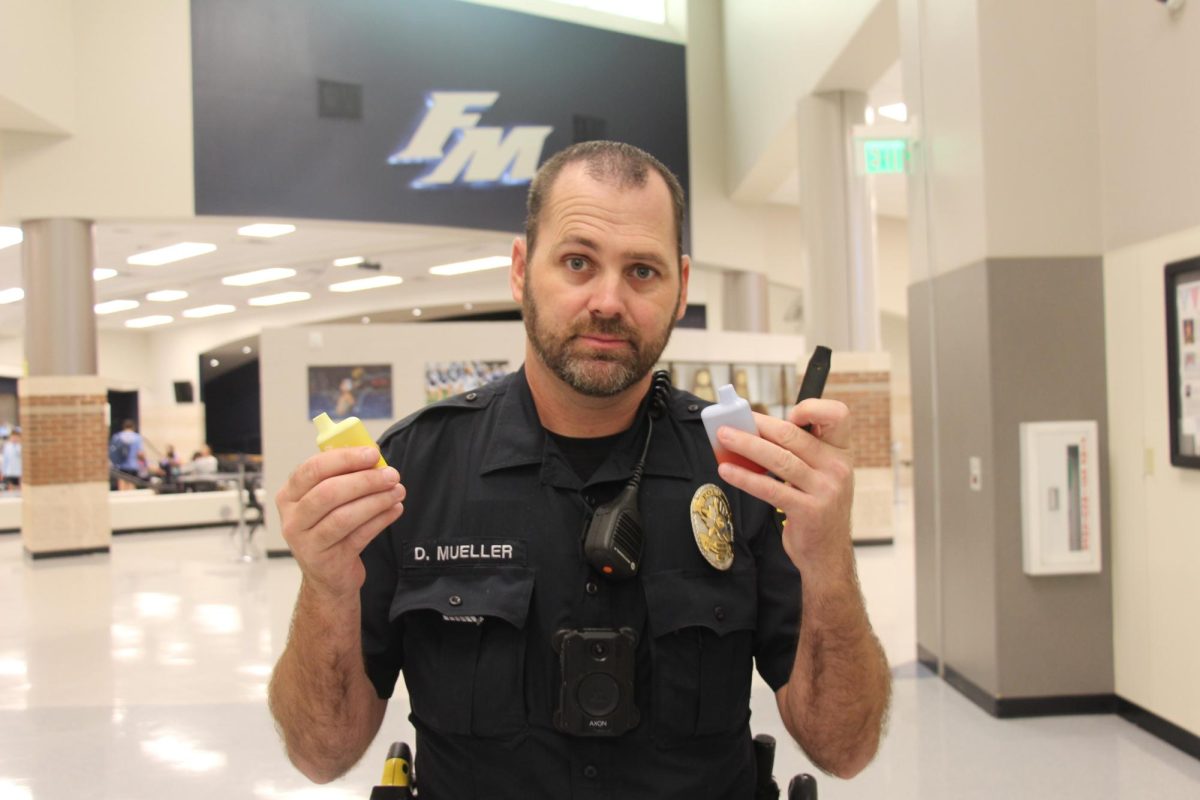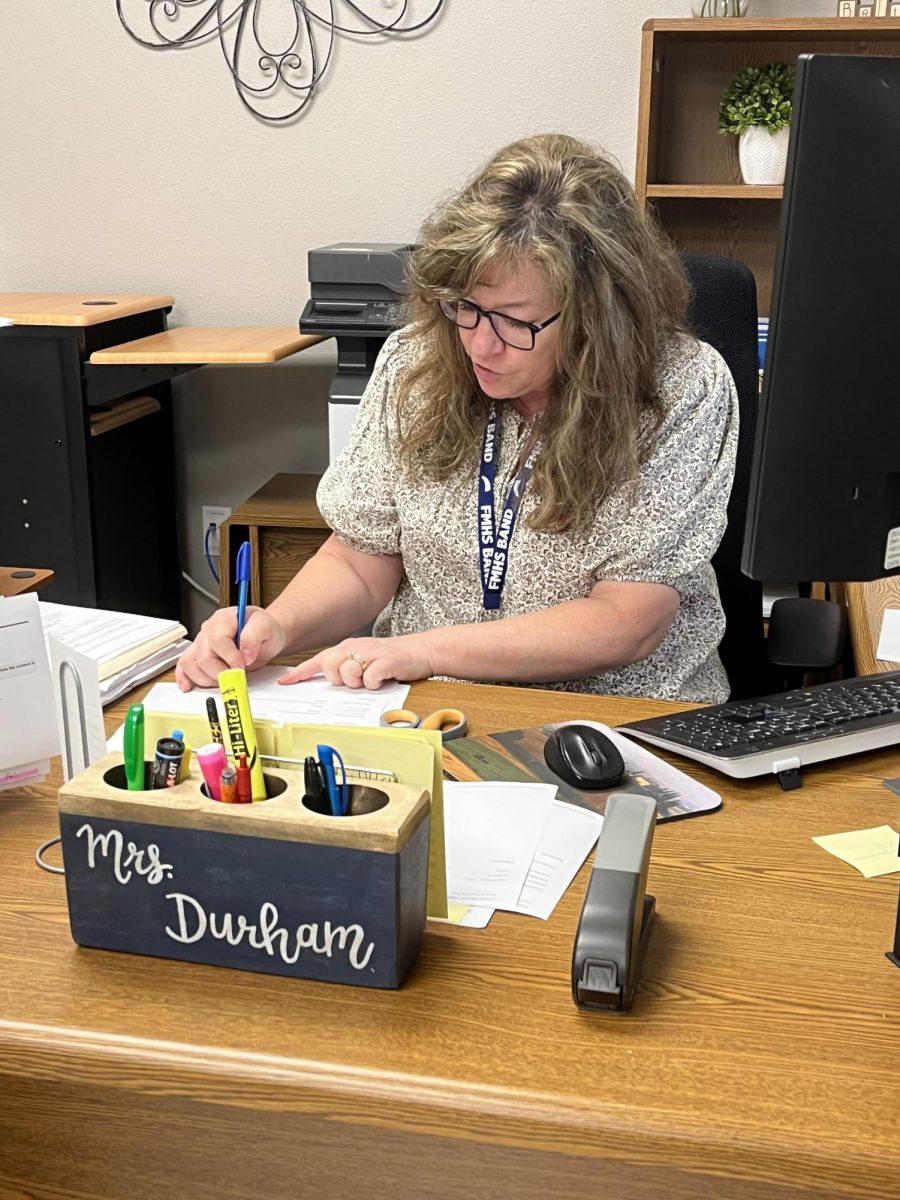House Bill 114, passed by Texas’ 88th Legislative Session, outlines a new vape policy intended for implementation in all public schools across the state. Signed into law by Gov. Abbott on June 13, the bill is to take effect on Sept. 1. However, most public school districts, Lewisville ISD included, are enforcing the new vape policy in early August, with the start of the school year.
The new policy mandates that any public school student possessing, using, or delivering vape devices (or any part of a vape device) within 300 feet of school property must be placed into a Disciplinary Alternative Education program (DAEP). The length of stay for each student is at the discretion of each individual school district. In addition to metal detectors and supervised bathroom breaks, time spent in DAEP is academically rigorous for students.
“DAEP is an alternative school in LISD. It’s very structured, very discipline oriented. You sit at a desk for eight straight hours, with no distractions. All you have to do is a pile of work. It’s beneficial for some of our students who get in trouble because they really focus hard for 20 days and they come back at a better place than they left,” School Resource Officer Derek Mueller said.
Previously, consequences for vape-related offenses were decided on an individual basis, that is, by each district. But, as the frequency of drug use appears to climb among teens in the U.S., the stricter vape policy attempts to curb such an increase.
Flower Mound High School is no exception to this trend. Over the past few years, vaping incidents have appeared to spike dramatically among the student body, in part due to improvements in design that have made vapes slimmer, more compact, and easier for students to hide. In fact, Officer Mueller reports having collected over 100 vapes during the last school year.
“The last five years, it’s gotten really bad. You go back 10 years, the vapes were about the size of my fist, with a straw coming out of them… now they make them cheaper and disposable. It’s just been a fight that has been very very hard,” Officer Mueller said.
Within the first two weeks of this school year alone, at least five students have been caught with vaping devices. Students possessing tobacco-containing vapes were enrolled in the district’s DAEP, while those in possession of other drugs, such as cannabis, were sent directly to jail.
“This year, we’re at three vapes and two dab pens…so it’s been a very busy start to the school year,” Officer Mueller said.
In addition to advances in vape technology, students appear to have become increasingly adept at hiding the vapes from the sight of teachers and administrative staff. Plugging vapes into computers like flash drives, concealing “highlighter” vapes in pencil pouches, and stuffing vapes into their tennis shoes are a few of the many methods that students have tried.
“We have a lot of kids who would have [the vape] in their sleeve,” English teacher Dr. Angela Dierschke said. “[Kids] will also just stick [vapes] in their underwear, walk into the bathroom, pull it out and vape, and then hand it to the next kid. It’s pretty gross,” Officer Mueller added.
Locking school bathrooms has become common practice for administrators, as students regularly occupy bathroom stalls for the use or exchange of vapes during school hours. According to Officer Mueller, in closing bathrooms in which students most frequently vape, administrators hope to prevent vape-related offenses. However, some students and staff question the effectiveness of this method, arguing that students who vape will simply find alternative locations to do so.
“If they’re going to do it, they’re going to do it. I don’t know that people necessarily care about consequences if they’re planning on breaking the rules anyway,” history teacher Mrs. Kendra Garrett said.
Additionally, locked bathrooms have developed into a major nuisance for students. Students who attend classrooms near locked bathrooms must now take additional time to search neighboring hallways for available restrooms, an inconvenience especially during the short passing periods.
“It’s very frustrating. It’s frustrating for the teachers as well, because it’s extra monitoring. Now it’s not just three doors down and you’re going to the restroom. Now it’s five hallways down or a stair level down,” Garrett said.
It’s worth noting that Principal Chad Russell offered an alternative perspective on the school’s practice of locking bathroom doors, citing graffiti and plumbing malfunctions as the major reasons why school bathrooms are shut down.
Nonetheless, most teachers seem to come to the consensus that teen vaping is an issue that needs to be proactively addressed. Some agree that although unpopular, increasing the severity of discipline associated with vape related offenses will discourage students from engaging in the illegal activity.
“It’s being realistic. It’s just like when mom and dad put down a rule that you really don’t like. It’s for your own protection, even though you may not see it that way,” Dierschke said.
However, as it has been only three weeks since the implementation of the new vape policy, its effect on vaping within the student body remains ambiguous. Administrators will be closely monitoring vaping uptake among students throughout the remainder of the school year.




![Principal Chad Russell checks the time in the main hallway before first period. Russell and the administration implemented a revised bell schedule for the 2023-24 school year, which made notable changes to advisory and A lunch. “So we just cut the loss out, packed [advisory] into the end of 2nd period,” Russell said. “Lots of strategy.”](https://fmhswire.com/wp-content/uploads/2023/09/IMG_2388-1200x900.jpeg)



Debbie Andrews • Sep 10, 2023 at 2:54 PM
At least they are not doing drugs.
Candace Melone • Sep 6, 2023 at 10:20 AM
I think they’re making school seem like a prison! Know wonder kids hate school.
They need to stop worrying about kids vaping and concentrate on other important issues, liking bullying for one!